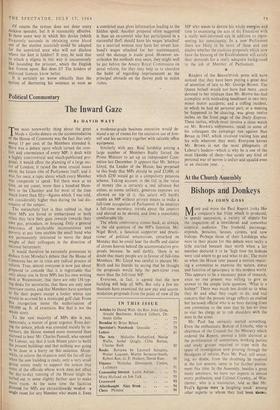Political Commentary
The Inward Gaze
By DAVID WATT
Tim most noteworthy thing about the great Mods v. Goths debate on the accommodation of the House of Commons was the fact that only about 15 per cent of the Members attended it. Here was a debate upon which turned the com- fort and convenience of every MP; it dealt with a highly controversial and much-publicised pro- posal; it would affect the planning of a large sec- tor of London; it raised the most crucial issues about the future role of Parliament itself; and it was, for once, a topic about which every Meinber Was competent to speak. Yet there were at no time, on my count, more than a hundred Mem- bers in the Chamber and for most of the time much fewer than fiAy—figures which, I was told, are considerably higher than during the last dis- cussion of the subject.
The melancholy fact is thus rubbed in, that most MPs are bored or embarrassed or both When they turn their gaze inwards towards their own pay, procedure, or housing. Only a general awareness of intolerable inconvenience and Poverty at any time enables the small band who are permanently interested to move the dead Weight of their colleagues in the direction of rational betterment.
It would therefore be extremely premature to deduce from Monday's debate that the House of Commons has set in train any radical process of reform. True, almost everyone is now just about prepared to concede that it is regrettable that Only about one in three MPs has his own writing desk at Westminster, that there are only 134 typ- ing desks for secretaries, that there are only nine interview rooms, and that Members have nowhere to file their papers except a locker whose size would be scorned by a muoicipal golf club. From this recognition stems the authorisation of 100,000 sq. ft. of extension. But that is not the Whole story.
To the vast majority of MPs this is not, a:PParently, a matter of great urgency. Even dur- ing the debate, yvhioh was attended mainly by re- formers, the House seemed more reassured than alarmed to hear Mr. Charles Pannell, who opened for Labour, say that it took fifteen years to build the present buildings and that nothing was going to be done in a hurry on this occasion. Mean- While, to relieve the situation until the far-off day When the new building is ready, only a very small group seems ready to support the notion that some of the officials whose work does not affect the day-to-day running of the House might be turfed out to some slightly farther spot to make More room. At the same time the facilities Planned for MPs are extraordinarily modest—a Single room for any Member who wants it. Even
a moderate-grade business executive would de- mand a set of rooms for the exclusive use of him- self and his secretary together with suitable office equipment.
Similarly with pay. Real hardship among a large number of Members finally forced the Prime Minister to set up an independent Com- mittee last December. It appears that Mr. Selwyn Lloyd, the Leader of the House, has proposed to this body that MPs should be paid £3,000, of which £250 would go in a compulsory pensions scheme. Taking account in the fall in .the value of money this is certainty a real advance but unless, as seems unlikely, generous expenses are allowed on top of it, this salary will hardly enable an MP without private means to make a full-time occupation of Parliament if he employs a full-time secretary, travels about the country and abroad as he should, and lives a reasonably comfortable life.
The whole controversy comes back, as always, to the old question of the MP's function. Mr. Nigel Birch, a fanatical supporter' and -practi- tioner of political amateurism, remarked on Monday that he could hear the shuffle and clatter of cloven hooves behind the accommodation pro- posals because, he said darkly, 'there is no doubt that many people are in favour of full-time Members.' Mr. Lloyd was careful to placate Mr. Birch and his friends by saying that he thought the proposals would help the part-timer even more than the full-time MP.
Everyone, in fact, is agreed that the new building will help all MPs. But only a few en- thusiasts have examined the new pay and accom- modation proposals from the point of view of the
MP who wants to devote his whole energies and time to examining the acts of the Executive with a really well-informed eye in addition to repre- senting his constituents. In a new Parliament there are likely to be more of these and one doubts whether the cautious proposals which now have the blessing of the Establishment will satisfy their demands for a really adequate background to the job of Member of Parliament.
Readers of the Beaverbrook press will have noticed that they have been paying a great deal of attention of late to Mr. George Brown. The Queen heself would not have had more ..pace devoted to her mishaps than Mr. Brown has had (complete with misleading headlines) in two very minor motor accidents; and a trifling incident, in which he had no personal part, at a meeting he happened to be chairing, was given twelve inches on the front page of the Daily Express. These tactics, which must involve a close watch on Mr. Brown's moVements, recall, to some of his colleagues the campaign run against Nye Bevan in 1947, which involved trailing him and his wife wherever they went. Everyone knows Mr. Brown is not the most phlegmatic of Labour's leaders—which is why he is one of the most likeable of them—but' surely any kind of personal war of nerves is unfair and squalid even in an election year.
























 Previous page
Previous page